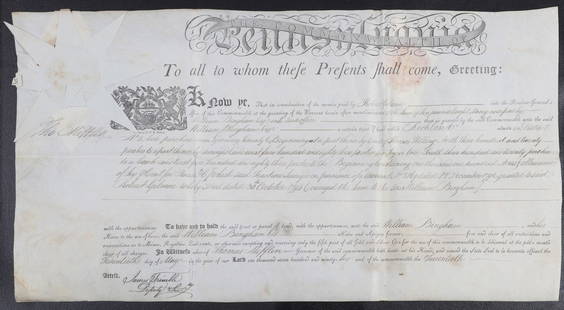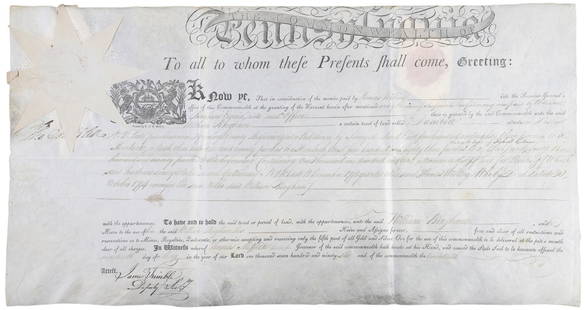
1681 WILLIAM PENN Signed Pennsylvania Land Grant
Similar Sale History
Recommended Items





Item Details
Description
Autographs
Rare 1681 Original William Penn Signed Vellum Land Grant as Proprietor and Governor of the Province of Pennsylvania
WILLIAM PENN (1644-1718). English Real Estate Entrepreneur, Philosopher, Early Quaker and Founder of the Province of Pennsylvania.
1681-Dated, Original “Charter” Period, Important Manuscript Document Signed, “Wm Penn” as Governor of the Province of Pennsylvania, 1 page, Vellum, measuring 8” wide x 17.25” tall, Fine. Actual use with some wear, folds, edge chips, loss at lower left not affecting any text, with expected tone. It has a 2” long fine slit next to Penn’s 3” long signature at bottom, likely where some offical added seal or ribbon would have been affixed as was the standard of period. This Land Grant on vellum is to 4 different people. The handwritting is in Olde English. thus very hard to decipher, but it appears 5,000 acres were granted to Isack Marshall and 1,000 acres each to H. South, J. Moore and S. Coles. Dates mentioned appear to begin within 5 or 6 months after King Charles II signed the historic Charter in March of 1681. The historic signature, “Wm Penn” is quite large and clearly readable being written in brown ink within a large open area at the bottom of this document. The earliest William Penn signed document we have offered and possibly worth a premium as such.
William Penn founded the Province of Pennsylvania, the British North American colony that became the U.S. State of Pennsylvania. The democratic principles that he set forth served as an inspiration for the United States Constitution. Politically far ahead of his time, Penn also published a plan for a United States of Europe, "European Dyet, Parliament or Estates."
The founding of Pennsylvania by William Penn:
In 1677, Penn's chance came, as a group of prominent Quakers, among them Penn, received the colonial province of West New Jersey (half of the current state of New Jersey). That same year, two hundred settlers from the towns of Chorleywood and Rickmansworth in Hertfordshire and other towns in nearby Buckinghamshire arrived, and founded the town of Burlington.
Penn, who was involved in the project but himself remained in England, drafted a charter of liberties for the settlement. He guaranteed free and fair trial by jury, freedom of religion, freedom from unjust imprisonment and free elections.
King Charles II of England had a large loan with Penn's father, after whose death, King Charles settled by granting Penn a large area west and south of New Jersey on March 4, 1681. Penn called the area Sylvania (Latin for woods), which Charles changed to Pennsylvania in honor of the elder Penn. Perhaps the king was glad to have a place where religious and political outsiders (like the Quakers, or the Whigs, who wanted more influence for the people's representatives) could have their own place, far away from England.
One of the first counties of Pennsylvania was called Bucks County, named after Buckinghamshire (Bucks) in England, where the Penn's family seat was, and from whence many of the first settlers came.
Although Penn's authority over the colony was officially subject only to that of the king, through his Frame of Government he implemented a democratic system with full freedom of religion, fair trials, elected representatives of the people in power, and a separation of powers — again ideas that would later form the basis of the American constitution.
The freedom of religion in Pennsylvania (complete freedom of religion for everybody who believed in God) brought not only English, Welsh, German and Dutch Quakers to the colony, but also Huguenots (French Protestants), Mennonites, Amish, and Lutherans from Catholic German states.
Penn had hoped that Pennsylvania would be a profitable venture for himself and his family. Penn marketed the colony throughout Europe in various languages and, as a result, settlers flocked to Pennsylvania. Despite Pennsylvania's rapid growth and diversity, the colony never turned a profit for Penn or his family. In fact, Penn would later be imprisoned in England for debt and, at the time of his death in 1718, he was penniless.
Rare 1681 Original William Penn Signed Vellum Land Grant as Proprietor and Governor of the Province of Pennsylvania
WILLIAM PENN (1644-1718). English Real Estate Entrepreneur, Philosopher, Early Quaker and Founder of the Province of Pennsylvania.
1681-Dated, Original “Charter” Period, Important Manuscript Document Signed, “Wm Penn” as Governor of the Province of Pennsylvania, 1 page, Vellum, measuring 8” wide x 17.25” tall, Fine. Actual use with some wear, folds, edge chips, loss at lower left not affecting any text, with expected tone. It has a 2” long fine slit next to Penn’s 3” long signature at bottom, likely where some offical added seal or ribbon would have been affixed as was the standard of period. This Land Grant on vellum is to 4 different people. The handwritting is in Olde English. thus very hard to decipher, but it appears 5,000 acres were granted to Isack Marshall and 1,000 acres each to H. South, J. Moore and S. Coles. Dates mentioned appear to begin within 5 or 6 months after King Charles II signed the historic Charter in March of 1681. The historic signature, “Wm Penn” is quite large and clearly readable being written in brown ink within a large open area at the bottom of this document. The earliest William Penn signed document we have offered and possibly worth a premium as such.
William Penn founded the Province of Pennsylvania, the British North American colony that became the U.S. State of Pennsylvania. The democratic principles that he set forth served as an inspiration for the United States Constitution. Politically far ahead of his time, Penn also published a plan for a United States of Europe, "European Dyet, Parliament or Estates."
The founding of Pennsylvania by William Penn:
In 1677, Penn's chance came, as a group of prominent Quakers, among them Penn, received the colonial province of West New Jersey (half of the current state of New Jersey). That same year, two hundred settlers from the towns of Chorleywood and Rickmansworth in Hertfordshire and other towns in nearby Buckinghamshire arrived, and founded the town of Burlington.
Penn, who was involved in the project but himself remained in England, drafted a charter of liberties for the settlement. He guaranteed free and fair trial by jury, freedom of religion, freedom from unjust imprisonment and free elections.
King Charles II of England had a large loan with Penn's father, after whose death, King Charles settled by granting Penn a large area west and south of New Jersey on March 4, 1681. Penn called the area Sylvania (Latin for woods), which Charles changed to Pennsylvania in honor of the elder Penn. Perhaps the king was glad to have a place where religious and political outsiders (like the Quakers, or the Whigs, who wanted more influence for the people's representatives) could have their own place, far away from England.
One of the first counties of Pennsylvania was called Bucks County, named after Buckinghamshire (Bucks) in England, where the Penn's family seat was, and from whence many of the first settlers came.
Although Penn's authority over the colony was officially subject only to that of the king, through his Frame of Government he implemented a democratic system with full freedom of religion, fair trials, elected representatives of the people in power, and a separation of powers — again ideas that would later form the basis of the American constitution.
The freedom of religion in Pennsylvania (complete freedom of religion for everybody who believed in God) brought not only English, Welsh, German and Dutch Quakers to the colony, but also Huguenots (French Protestants), Mennonites, Amish, and Lutherans from Catholic German states.
Penn had hoped that Pennsylvania would be a profitable venture for himself and his family. Penn marketed the colony throughout Europe in various languages and, as a result, settlers flocked to Pennsylvania. Despite Pennsylvania's rapid growth and diversity, the colony never turned a profit for Penn or his family. In fact, Penn would later be imprisoned in England for debt and, at the time of his death in 1718, he was penniless.
Buyer's Premium
- 23%
1681 WILLIAM PENN Signed Pennsylvania Land Grant
Estimate $5,000 - $10,000
3 bidders are watching this item.
Shipping & Pickup Options
Item located in Rancho Santa Fe, CA, usSee Policy for Shipping
Payment

Related Searches
TOP
































![[QUAKER HISTORY -- WILLIAM PENN & PENNSYLVANIA]. A group of 6 works in 8 volumes, ALL FIRST: [QUAKER HISTORY -- WILLIAM PENN & PENNSYLVANIA]. A group of 6 works in 8 volumes, ALL FIRST EDITIONS, comprising: PENN, William and George WHITEHEAD. The Christian-Quaker, and his divine testimony...](https://p1.liveauctioneers.com/197/329395/177650565_1_x.jpg?height=310&quality=70&version=1715364962)











